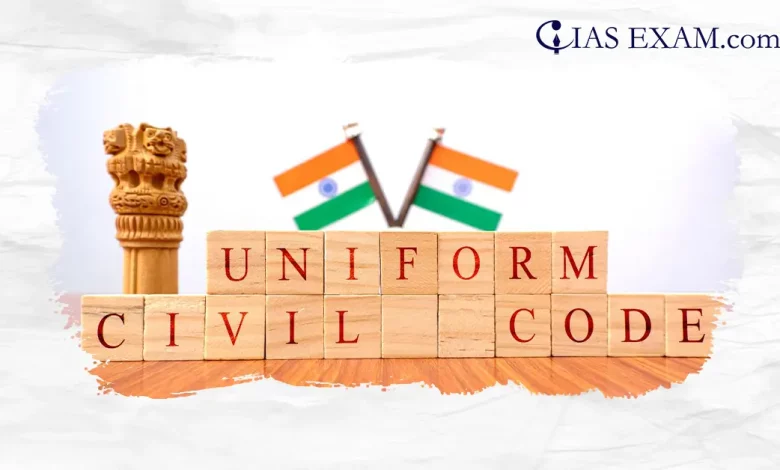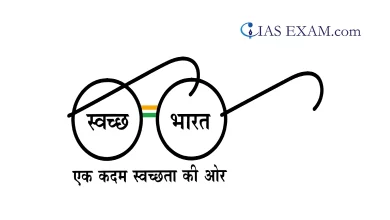Issues with Uttarakhand’s Uniform Civil Code Bill, 2024
GS Paper 2 - Indian Polity, DPSPs, Fundamental Rights

Context
Recently, the Uttarakhand Govt. passed the Uniform Civil Code (UCC) Bill, 2024 which seeks to consolidate the laws regarding marriage and property inheritance. To become law, the Bill simply needs the President’s approval. The Bill mandates compulsory registration of live-in relationships and criminalizes them if certain requirements are not satisfied, is a worrying aspect. This action calls into question the state’s authority to control interpersonal interactions in addition to violating individual autonomy.
About Uniform Civil Code
- The concept of a Uniform Civil Code has been a subject of debate since the inception of the Indian Constitution. The Constitution’s framers left it to the government’s discretion to implement the UCC.
- Article 44 of the Directive Principles of State Policy envisions the enactment of a Uniform Civil Code, aiming to promote gender equality, social justice, and secular principles.
- However, the implementation of a UCC has remained elusive due to its complex interplay with religious beliefs, cultural practices, and political sensitivities. Goa is the only state in India with a UCC, following the Portuguese Civil Code of 1867.
Key Highlights of Uttarakhand’s UCC Bill
- Under the direction of Article 44 of the Constitution, the UCC seeks to supersede the distinct personal rules of every religion, concentrating on marriage, divorce, adoption, and inheritance. All citizens would be subject to the same personal laws under this code, regardless of their religion.
- The committee’s main recommendations include outlawing polygamy, nikah halala, triple talaq, iddat (a waiting period that women must observe after a Muslim marriage dissolves), child marriage, a uniform age for girls to marry in all religions, and the requirement that live-in relationships be registered.
- The Bill aims to focus on gender equality by treating men and women equally in matters such as inheritance and marriage. It is likely to extend an equal property share to Muslim women against the existing 25% share accorded under the Muslim Personal Laws.
- Scheduled tribes (STs) have been exempted from the purview of the bill. The tribal population in the state, which is around 3%, had been voicing its dissent against UCC in the wake of the special status accorded to them.
Concerns and Issues
- The minimum age for marriage is set to remain the same – 18 years for women and 21 years for men.
- A debatable feature of the Bill is the mandatory requirement of registration of a live-in relationship and its criminalisation, if certain conditions are not complied with.
- The criminal punishment — either a fine or jail, or both — for failing to file the statement is another unwelcome aspect of the bill. The couple’s submission of fraudulent information will result in penalties. The police station that oversees the couple will be informed about the live-in relationship’s specifics by the Registrar.
- It is hardly unexpected that the Bill chills live-in relationships and subtly discourages them in a society that feeds off moral policing of young couples.
- The involvement of Police actually heightens the concerns. Couples will be reluctant to commit to a serious relationship since breaking the law might have both criminal and civil repercussions, as required by regulatory rules.
- With this mandate, the proposed law will confer disproportionate power on the state to penalise consensual and live-in relations and violate individual autonomy.
Considerations to be taken before implementation of UCC
- A democratic liberal state must clearly be able to differentiate as to what constitutes a criminal offense and what is not. This policy ought to be in line with the rights guaranteed by the Constitution. The conservative majority’s disapproval of some social behaviors is inadequate justification for their criminalization.
- Vulnerable couples are most likely to be impacted first by a proposed law with a heavy regulatory burden on live-in relationships. It is inevitable that the Bill’s provisions would worsen the situation rather than make it better. The Govt. must enact inclusionary regulations to support the bodily integrity of its population.
- Individuals have the inherent right to choose their life partners, and neither the State or society, nor the parents of the individuals should have the authority to interfere with or restrict this right when it concerns “two consenting adults”.
- The proportionality test, as is well known, comprises four stages: legitimate goal, rational connection, necessity (i.e., least restrictive and effective measure), and balancing. Such regulations should be tested on the touchstone of these principles before being brought into effect.
Conclusion
Uttarakhand’s Uniform Civil Code Bill, 2024, epitomizes the complex interplay between legal uniformity, cultural diversity, and constitutional principles. As India navigates the delicate balance between tradition and modernity, it is imperative to engage in inclusive and informed dialogues to address the multifaceted challenges posed by personal laws. The discourse surrounding the UCC reflects the evolving contours of Indian democracy, wherein the pursuit of justice, equality, and pluralism remains central to the nation’s ethos. While the road to implementing a Uniform Civil Code may be fraught with challenges, it presents an opportunity to reaffirm India’s commitment to democratic ideals and inclusive governance.
SOURCE: The Hindu





.png)



